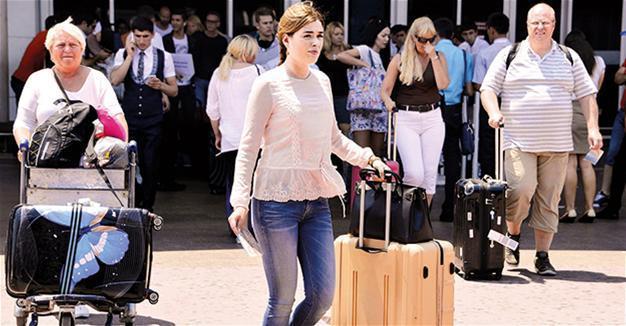Turkey calls on Russia to lift sanctions, ease visa liberalization to boost trade
Serkan Demirtaş - MOSCOW

Turkey has reiterated its call on Russia to remove all sanctions imposed on trade and to ease visa restrictions to further boost economic cooperation, suggesting the normalization process between the two countries was not progressing at the desired pace.
“Turkish-Russian relations are passing through a normalization process. It is my hope that this process will be accomplished and that we’ll go beyond the level of the relations we had last year,” Hüseyin Diriöz, Turkey’s ambassador to Moscow, said at the Eurasian Talks panel in Moscow on Dec. 13.
“I can assure you that I will exert efforts to this direction,” he added.
The panel brought together Turkish and Russian business leaders, former diplomats, journalists and other prominent figures to discuss “Turkish-Russian relations from an economic perspective.”
The two countries ceased months of diplomatic tensions in late June after Turkish President Recep Tayyip Erdoğan sent a letter to Russian President Vladimir Putin to express Turkey’s regret over the downing of a Russian warplane on Nov. 24, 2015. The two countries have launched a normalization process, but only a small portion of trade restrictions imposed by Russia on Turkey have been removed, while visa restrictions remain unchanged.
“To reach the economic objectives set by the two countries, both sides should work together and, in particular, restrictions on Turkish private companies should be lifted. We also hope that visa liberalization for Turkish business leaders will be introduced,” Diriöz said.
He recalled that both parties had the necessary political will to improve economic and trade relations in order to fulfill their common target of increasing trade volume to $100 billion by the year of 2023. As a result of the crisis between the two countries, the trade volume in the first nine months of 2016 was at $12 billion.
‘Restrictions must be lifted’
The delays in the normalization process affected the Turkish private sector the most. “Our expectation from Russia is to take steps to ensure pre-Nov. 24, 2015, relations are restored. We expect the removal of the Dec. 29 (2015) decree and expect Russia to reinstate the visa liberalization process,” Özgür Eroğlu, CEO of the GAMA Power Systems, told the panel.
The three main areas where Turkish and Russian business circles are currently focused on is completing the Akkuyu nuclear plant, the Turkish Stream gas pipeline project and the ongoing construction projects for Russia’s 2018 World Cup, he said.
“Our expectation from Turkey is to provide ways to loan credits,” he added.
‘Akkuyu backbone of Turkish-Russian cooperation’
The panel also discussed the ongoing major Turkish-Russian cooperation on energy where Oleg Titov, the acting CEO of the Akkuyu nuclear project, was among the panelists. The project, which is worth $20 billion, advanced only slowly during the political crisis between Ankara and Moscow, he said, reiterating that one of the four units of the nuclear plant would begin to function in 2023, as the two presidents had announced earlier.
“Our aim is not only to build a nuclear plant. We also want it to become the backbone of future Turkish-Russian relations,” Titov said.
He added that 264 Turkish students were being educated in Russian nuclear institutions. “We are raising a new generation and the future nuclear cadres of Turkey.”
Titov said Putin was closely following the Akkuyu nuclear project and that he recently asked him about the participation of Turkish private companies in the project.
“We are now working on the participation of Turkish companies in the project. Our ongoing talks with the Energy Ministry are about the number of Turkish companies that would be involved,” Titov said.
 Turkey has reiterated its call on Russia to remove all sanctions imposed on trade and to ease visa restrictions to further boost economic cooperation, suggesting the normalization process between the two countries was not progressing at the desired pace.
Turkey has reiterated its call on Russia to remove all sanctions imposed on trade and to ease visa restrictions to further boost economic cooperation, suggesting the normalization process between the two countries was not progressing at the desired pace.